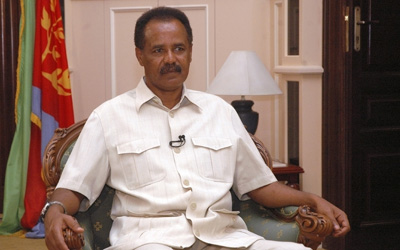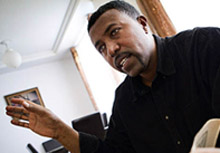
Eritrea: Let’s lift the shroud of 10 years of misery
Since Zaid Tewelde’s husband, an Eritrean freedom fighter turned playwright and journalist, was arrested in September 2001, she has spent each passing day coping with the burning questions of her two young sons, age 9 and 10, “Where is my dad? When are we going to see him?” And she is not alone. Like Zaid, the…

Truth about jailed journalists is locked away in Eritrea
In the reclusive Red Sea nation of Eritrea, the fate of 10 journalists who disappeared in secret prisons following a September 2001 government crackdown has been a virtual state secret—only occasionally pierced by shreds of often unverifiable, secondhand information smuggled out of the country by defectors or others fleeing into exile.

September 18, 2001, in Eritrea: A memory that never fades
It feels like it happened just yesterday. It was 7 a.m. on an average day in September in Asmara, Eritrea. My brain was still reshuffling the information I had gathered about the terrorist attacks on the World Trade Center a week earlier. I was writing an article on it for the next issue of Setit,…
Attacks on the Press 2007: Eritrea
Eritrea remained the leading jailer of journalists in Africa, with as many as 14 writers and editors held incommunicado in secret locations. At least one journalist died in state custody, sources told CPJ in February. The only country in sub-Saharan Africa without a single independent news outlet, Eritrea subjected its own state-media journalists to government…
German media aid to Eritrea raises concerns
Dear Minister Wieczorek-Zeul: The Committee to Protect Journalists notes that the German government has decided to fund the training of journalists working for Eritrea’s state-controlled media while the nation’s independent press remains shut down and more than a dozen publishers and editors continue to be held incommunicado, many since September 2001.
Attacks on the Press 2006: Countries That Have Jailed Journalists
ALGERIA: 2 Djamel Eddine Fahassi, Alger Chaîne III IMPRISONED: May 6, 1995 Fahassi, a reporter for the state-run radio station Alger Chaîne III and a contributor to several Algerian newspapers, including the now-banned weekly of the Islamic Salvation Front, Al-Forqane, was abducted near his home in the al-Harrache suburb of the capital, Algiers, by four…
Attacks on the Press 2006: Countries That Have Jailed Journalists
ALGERIA: 2 Djamel Eddine Fahassi, Alger Chaîne III IMPRISONED: May 6, 1995 Fahassi, a reporter for the state-run radio station Alger Chaîne III and a contributor to several Algerian newspapers, including the now-banned weekly of the Islamic Salvation Front, Al-Forqane, was abducted near his home in the al-Harrache suburb of the capital, Algiers, by four…
Attacks on the Press 2005: Countries That Have Jailed Journalists (Follow Links for More Details)
AFGHANISTAN: 1 Ali Mohaqqiq Nasab, Haqooq-i-Zan (Women’s Rights) Imprisoned: October 1, 2005 The attorney general ordered editor Nasab’s arrest on blasphemy charges after the religious adviser to President Hamid Karzai, Mohaiuddin Baluch, filed a complaint about his magazine. “I took the two magazines and spoke to the Supreme Court chief, who wrote to the attorney…
15 Journalists imprisoned in Eritrea
15 Journalists imprisoned in Eritrea Zemenfes Haile, Tsigenay Imprisoned: January 1999 Sometime in early 1999, Haile, founder and manager of the private weekly Tsigenay, was detained by Eritrean authorities and sent to Zara Labor Camp in the country’s lowland desert. Authorities accused Haile of failing to complete the National Service Program, but sources told CPJ…
Attacks on the Press in 2003: Journalists in Prison
There were 138 journalists in prison around the world at the end of 2003 who were jailed for practicing their profession. The number is the same as last year. An analysis of the reasons behind this is contained in the introduction on page 10. At the beginning of 2004, CPJ sent letters of inquiry to…